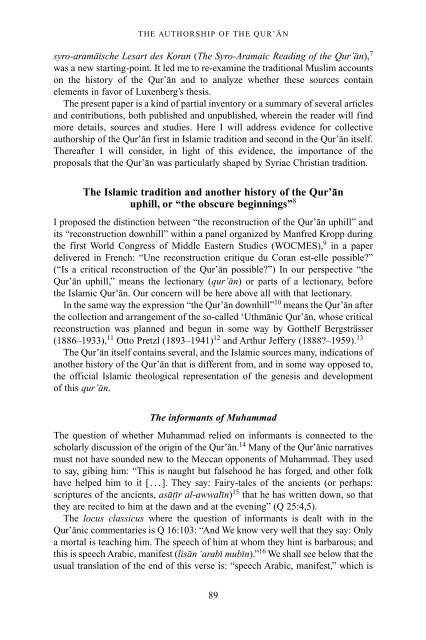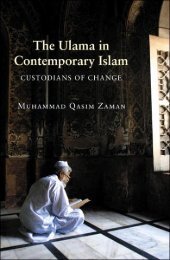The Qur'an in its historical context (pdf - Islam and Christian-Muslim ...
The Qur'an in its historical context (pdf - Islam and Christian-Muslim ...
The Qur'an in its historical context (pdf - Islam and Christian-Muslim ...
Create successful ePaper yourself
Turn your PDF publications into a flip-book with our unique Google optimized e-Paper software.
THE AUTHORSHIP OF THE QUR’AN<br />
syro-aramäische Lesart des Koran (<strong>The</strong> Syro-Aramaic Read<strong>in</strong>g of the Qur’an), 7<br />
was a new start<strong>in</strong>g-po<strong>in</strong>t. It led me to re-exam<strong>in</strong>e the traditional <strong>Muslim</strong> accounts<br />
on the history of the Qur’an <strong>and</strong> to analyze whether these sources conta<strong>in</strong><br />
elements <strong>in</strong> favor of Luxenberg’s thesis.<br />
<strong>The</strong> present paper is a k<strong>in</strong>d of partial <strong>in</strong>ventory or a summary of several articles<br />
<strong>and</strong> contributions, both published <strong>and</strong> unpublished, where<strong>in</strong> the reader will f<strong>in</strong>d<br />
more details, sources <strong>and</strong> studies. Here I will address evidence for collective<br />
authorship of the Qur’an first <strong>in</strong> <strong>Islam</strong>ic tradition <strong>and</strong> second <strong>in</strong> the Qur’an <strong>its</strong>elf.<br />
<strong>The</strong>reafter I will consider, <strong>in</strong> light of this evidence, the importance of the<br />
proposals that the Qur’an was particularly shaped by Syriac <strong>Christian</strong> tradition.<br />
<strong>The</strong> <strong>Islam</strong>ic tradition <strong>and</strong> another history of the Qur’an<br />
uphill, or “the obscure beg<strong>in</strong>n<strong>in</strong>gs” 8<br />
I proposed the dist<strong>in</strong>ction between “the reconstruction of the Qur’an uphill” <strong>and</strong><br />
<strong>its</strong> “reconstruction downhill” with<strong>in</strong> a panel organized by Manfred Kropp dur<strong>in</strong>g<br />
the first World Congress of Middle Eastern Studies (WOCMES), 9 <strong>in</strong> a paper<br />
delivered <strong>in</strong> French: “Une reconstruction critique du Coran est-elle possible?”<br />
(“Is a critical reconstruction of the Qur’an possible?”) In our perspective “the<br />
Qur’an uphill,” means the lectionary (qur’an) or parts of a lectionary, before<br />
the <strong>Islam</strong>ic Qur’an. Our concern will be here above all with that lectionary.<br />
In the same way the expression “the Qur’an downhill” 10 means the Qur’an after<br />
the collection <strong>and</strong> arrangement of the so-called ‘Uthmanic Qur’an, whose critical<br />
reconstruction was planned <strong>and</strong> begun <strong>in</strong> some way by Gotthelf Bergsträsser<br />
(1886–1933), 11 Otto Pretzl (1893–1941) 12 <strong>and</strong> Arthur Jeffery (1888?–1959). 13<br />
<strong>The</strong> Qur’an <strong>its</strong>elf conta<strong>in</strong>s several, <strong>and</strong> the <strong>Islam</strong>ic sources many, <strong>in</strong>dications of<br />
another history of the Qur’an that is different from, <strong>and</strong> <strong>in</strong> some way opposed to,<br />
the official <strong>Islam</strong>ic theological representation of the genesis <strong>and</strong> development<br />
of this qur’an.<br />
<strong>The</strong> <strong>in</strong>formants of Muhammad<br />
<strong>The</strong> question of whether Muhammad relied on <strong>in</strong>formants is connected to the<br />
scholarly discussion of the orig<strong>in</strong> of the Qur’an. 14 Many of the Qur’anic narratives<br />
must not have sounded new to the Meccan opponents of Muhammad. <strong>The</strong>y used<br />
to say, gib<strong>in</strong>g him: “This is naught but falsehood he has forged, <strong>and</strong> other folk<br />
have helped him to it [...]. <strong>The</strong>y say: Fairy-tales of the ancients (or perhaps:<br />
scriptures of the ancients, asatir al-awwal<strong>in</strong>) 15 that he has written down, so that<br />
they are recited to him at the dawn <strong>and</strong> at the even<strong>in</strong>g” (Q 25:4,5).<br />
<strong>The</strong> locus classicus where the question of <strong>in</strong>formants is dealt with <strong>in</strong> the<br />
Qur’anic commentaries is Q 16:103: “And We know very well that they say: Only<br />
a mortal is teach<strong>in</strong>g him. <strong>The</strong> speech of him at whom they h<strong>in</strong>t is barbarous; <strong>and</strong><br />
this is speech Arabic, manifest (lisan ‘arabi mub<strong>in</strong>).” 16 We shall see below that the<br />
usual translation of the end of this verse is: “speech Arabic, manifest,” which is<br />
89



